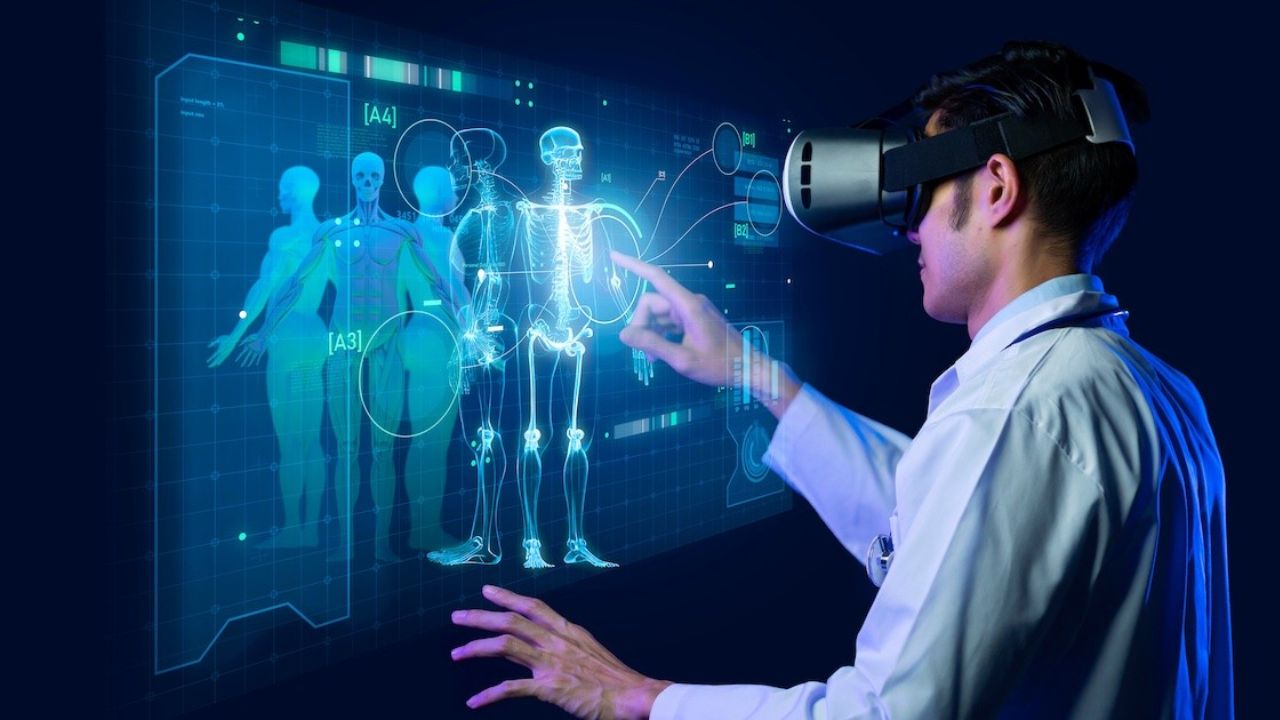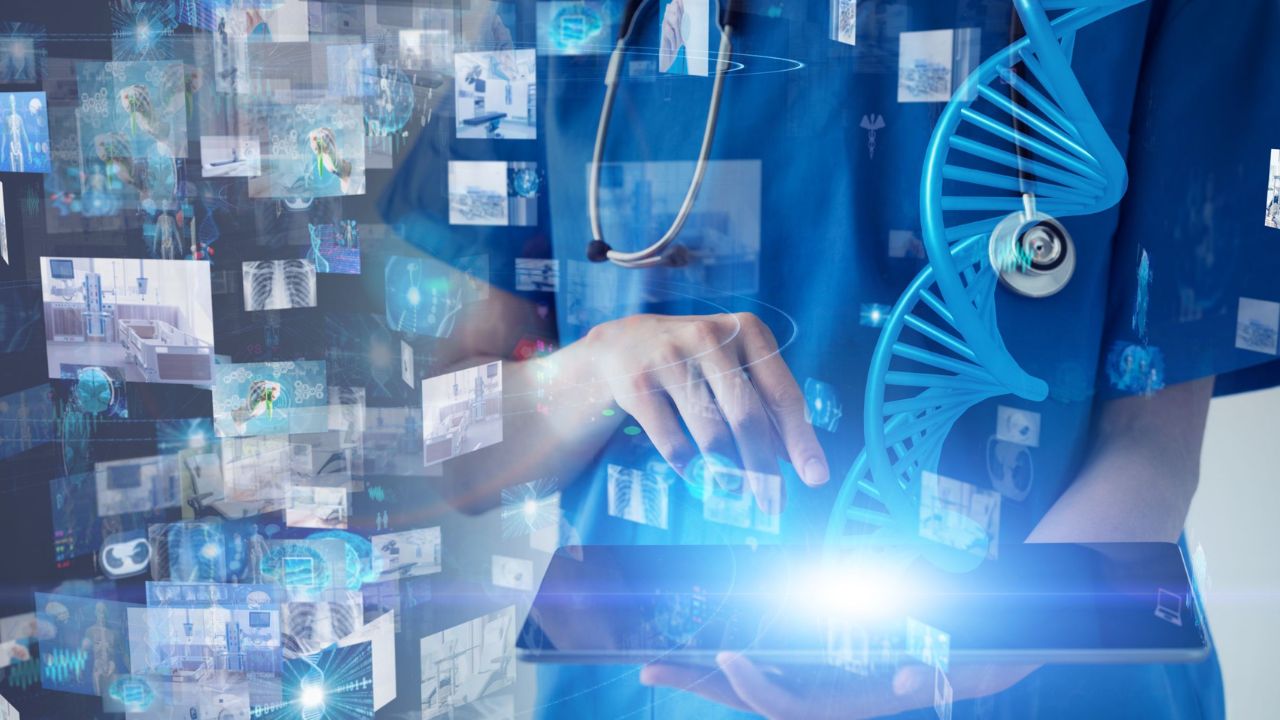
Post by : Zayd Kamal
In recent years, Artificial Intelligence in healthcare has emerged as a groundbreaking technology that is reshaping how medical professionals deliver care. From improving diagnostic accuracy to enhancing patient outcomes, AI is proving to be a game-changer in the medical field. This article delves into the various applications, benefits, and challenges of Artificial Intelligence in healthcare, providing a comprehensive overview of its impact on the industry.
Before diving into its applications in healthcare, it’s essential to understand what artificial intelligence (AI) is. AI refers to the simulation of human intelligence processes by computer systems. These processes include learning, reasoning, and self-correction. By analyzing vast amounts of data, AI can identify patterns, make decisions, and improve over time, making it a valuable tool for healthcare providers.
One of the most significant benefits of Artificial Intelligence in healthcare is its ability to improve diagnostic accuracy. AI algorithms can analyze medical images, such as X-rays, MRIs, and CT scans, to detect abnormalities that human eyes might miss. For example, AI-powered systems can identify tumors in radiology images with remarkable precision, reducing the likelihood of misdiagnosis and enabling timely treatment.
AI can analyze historical patient data to predict future health outcomes. By recognizing patterns and trends, AI systems can forecast potential health issues before they arise. For instance, predictive analytics can help identify patients at risk for chronic diseases such as diabetes or heart disease, allowing healthcare providers to implement preventive measures. This proactive approach not only enhances patient care but also reduces healthcare costs.
Every patient is unique, and Artificial Intelligence in healthcare allows for personalized treatment plans tailored to individual needs. By analyzing genetic information, lifestyle factors, and medical history, AI can recommend treatment options that are more likely to be effective for each patient. This personalized approach enhances patient engagement and satisfaction, as individuals feel their specific needs are being addressed.
AI-powered virtual health assistants are revolutionizing patient interaction with healthcare providers. These virtual assistants can answer patients' questions, provide medication reminders, and even schedule appointments. They enhance patient engagement by offering accessible support 24/7. For instance, chatbots can help triage symptoms, directing patients to the appropriate level of care while freeing up valuable time for healthcare professionals.
The process of discovering and developing new drugs is often lengthy and expensive. However, Artificial Intelligence in healthcare is streamlining this process. AI can analyze chemical compounds and predict their effectiveness in treating specific conditions, significantly reducing the time required for research and development. This innovation accelerates the introduction of new treatments to the market, potentially saving countless lives.
The integration of AI in healthcare offers numerous advantages:
Improved Efficiency: AI automates routine tasks, allowing healthcare professionals to focus on more complex patient care needs. This leads to better use of time and resources within healthcare facilities.
Enhanced Patient Outcomes: By improving diagnostic accuracy and personalizing treatment plans, AI contributes to better health outcomes for patients.
Cost Reduction: Early diagnosis and preventive care facilitated by AI can reduce hospitalizations and associated costs, making healthcare more affordable.
Data Management: AI can efficiently manage vast amounts of patient data, providing healthcare providers with valuable insights to improve care delivery.

While Artificial Intelligence in healthcare holds immense promise, it also faces several challenges:
Data Privacy and Security: With the increased use of AI comes the need for robust data protection measures. Patient data must be securely stored and processed to maintain confidentiality and compliance with regulations like HIPAA.
Bias in AI Algorithms: AI systems are only as good as the data they are trained on. If the data is biased or unrepresentative, it can lead to skewed results. Ensuring diversity in training data is crucial for fair and accurate AI applications.
Integration with Existing Systems: Implementing AI technologies in healthcare settings can be complex. It requires seamless integration with existing systems, which can be a significant barrier to adoption.
Acceptance by Healthcare Professionals: Some healthcare providers may be hesitant to adopt AI technologies, fearing they could replace human jobs. Education and training are essential to help professionals understand how AI can complement their work rather than replace it.
The future of Artificial Intelligence in healthcare looks promising. As technology continues to advance, we can expect more innovative applications to emerge. AI could play a critical role in addressing global health challenges, improving access to care, and ultimately saving lives.
For instance, remote monitoring of patients through AI can facilitate better management of chronic conditions, allowing for timely interventions. Furthermore, the use of AI in telemedicine is on the rise, providing patients in remote areas access to specialized care.
This article discusses Artificial Intelligence in healthcare and how it is changing the way doctors and patients interact. Artificial Intelligence in healthcare helps doctors make better diagnoses by analyzing images like X-rays. It can also predict health problems before they happen, creating personalized treatment plans for each patient. AI makes it easier for patients to get answers through virtual health assistants, who can remind them about medications and schedule appointments. However, there are challenges, like keeping patient data safe and making sure the AI is fair for everyone. Overall, Artificial Intelligence in healthcare is making medical care better and more efficient.
This information is provided by DXB News Network. We encourage kids and families to learn about Artificial Intelligence in healthcare and how it impacts our lives. Understanding these technologies can help everyone make informed choices about health. Stay curious and keep exploring the amazing world of healthcare
Artificial Intelligence in healthcare, AI in medicine, healthcare technology, diagnostic accuracy, predictive analytics, personalized treatment, virtual health assistants, drug discovery, patient outcomes, healthcare challenges, data privacy, AI algorithms, medical imaging, remote patient monitoring, telemedicine

VORGE by DXB News Network Launches from Dubai — A Global Business Editorial Initiative Connecting Visionaries Worldwide
After the success of Voices of UAE, DXB News Network unveils VORGE, a global editorial initiative sp

Kantara 2 Day 5 Box Office Collection: Rishab Shetty’s Actioner Smashes Records
Kantara 2 earns 10x more than Sunny Sanskari Ki Tulsi Kumari on Day 5. Rishab Shetty’s action-packed

AgraME 2025 Charts Middle East's Course to Food Resilience with Technology and Collaboration
AgraME 2025 inaugurated in Dubai, showcasing global agri-innovations, empowering Emirati talent, and

World Bank Raises 2025 MENAAP Growth but Cuts 2026 Outlook
World Bank lifts 2025 growth forecast for Middle East, North Africa, Afghanistan & Pakistan but warn

UAE, Jordan Strengthen Ties Through Presidential Letter
UAE President Sheikh Mohamed bin Zayed sends letter to Jordan's King Abdullah II, highlighting stron

Supreme Court Reserves Verdict in Surendra Koli Nithari Case
SC reserves verdict on Surendra Koli's curative plea in Nithari murder case, raising possibility of

How to Buy a Luxury Car in Dubai: Taxes, Import Rules, and Tips
Learn how to buy a luxury car in Dubai with our guide on taxes, import rules, registration, and tips

From Flying Taxis to Autonomous Delivery Dubai s Smart Transport Revolution
Explore Dubai s smart transport future with flying taxis autonomous vehicles and delivery drones sha

Are You Confusing Social Anxiety with Shyness Learn the Key Differences
Learn how to tell social anxiety from shyness recognize symptoms and get tips to manage anxiety for

Health Benefits of Pumpkin Seeds Nutritious Snack for Heart Brain & Skin
Discover the health benefits of pumpkin seeds a crunchy nutritious snack that boosts heart brain imm

Amazing Rice Water Benefits for Hair Grow Strong Shiny & Healthy Hair Naturally
Discover rice water benefits for hair growth shine and strength with easy home methods for naturally

Hair Growth Secrets Vitamins & Minerals for Thicker Healthier Hair
Boost natural hair growth with essential vitamins and minerals Strengthen thicken and nourish your h

Eat the Rainbow for Health Colorful Foods for Stronger Body & Mind
Boost your health by eating colorful fruits and vegetables daily Discover how a rainbow diet strengt

Effective Ways to Reduce Joint Pain and Stiffness This Winter
Learn simple ways to reduce joint pain and stiffness this winter with warmth exercises diet tips and

Facial Sculpting and Non Invasive Techniques Safe Beauty Trends for the Future
Explore facial sculpting and non invasive techniques shaping beauty care Safe affordable and natural